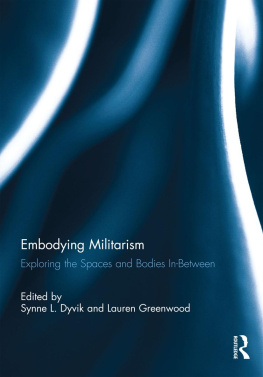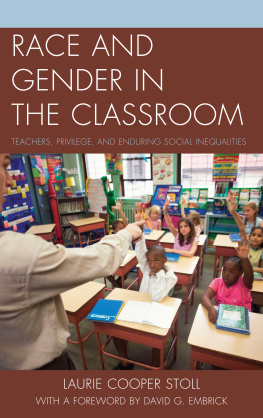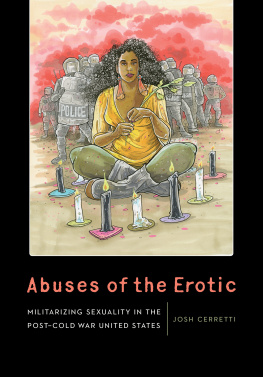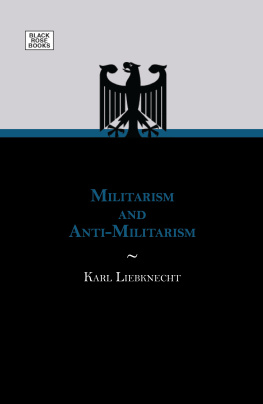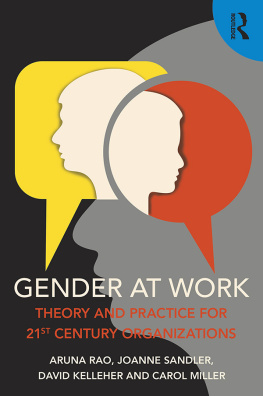
Published by
THE UNIVERSITY OF ALBERTA PRESS
Ring House 2
Edmonton, Alberta, Canada T6G 2E1
www.uap.ualberta.ca
Copyright 2015 The University of Alberta Press
LIBRARY AND ARCHIVES CANADA CATALOGUING IN PUBLICATION
Gendered militarism in Canada : learning conformity and resistance / edited by Nancy Taber.
Includes bibliographical references and index.
Issued in print and electronic formats.
ISBN 978-1-77212-084-4 (paperback).ISBN 978-1-77212-107-0 (epub).ISBN 978-1-77212-108-7 (kindle).ISBN 978-1-77212-109-4 (pdf)
1. Educational sociologyCanada. 2. MilitarismSocial aspectsCanada. 3. Sex roleCanada. I. Taber, Nancy, 1971, editor
| LC191.8.C2G45 2015 | 306.430971 | C2015-906538-0 |
| C2015-906539-9 |
First edition, first printing, 2015.
First electronic edition, 2015.
Digital conversion by Transforma Pvt. Ltd.
Copyediting by Angela Wingfield.
Proofreading by Joanne Muzak.
Indexing by Adrian Mather.
Cover design by Virginia Penny.
All rights reserved. No part of this publication may be reproduced, stored in a retrieval system, or transmitted in any form or by any means (electronic, mechanical, photocopying, recording, or otherwise) without prior written consent. Contact the University of Alberta Press for further details.
The University of Alberta Press supports copyright. Copyright fuels creativity, encourages diverse voices, promotes free speech, and creates a vibrant culture. Thank you for buying an authorized edition of this book and for complying with the copyright laws by not reproducing, scanning, or distributing any part of it in any form without permission. You are supporting writers and allowing University of Alberta Press to continue to publish books for every reader.
The University of Alberta Press is committed to protecting our natural environment. As part of our efforts, this book is printed on Enviro Paper: it contains 100% post-consumer recycled fibres and is acid- and chlorine-free.
The University of Alberta Press gratefully acknowledges the support received for its publishing program from the Government of Canada, the Canada Council for the Arts, and the Government of Alberta through the Alberta Media Fund.
This book has been published with the help of a grant from the Canadian Federation for the Humanities and Social Sciences, through the Awards to Scholarly Publications Program, using funds provided by the Social Sciences and Humanities Research Council of Canada.
CONTENTS
Patricia Gouthro
Learning, Gender, and Militarism
Nancy Taber
Jamie Magnusson and Shahrzad Mojab
Resisting and Reproducing Gendered Militarism Online
Laura Lane
Gender, Militarism, and Entertainment in Canada
Andrew Haddow
Learning Citizenship
Nancy Taber
Examining Ableist and Militarist Discourses in Education
Mark Anthony Castrodale
Sexual Diversity and Adult Education in the Canadian Armed Forces
Robert C. Mizzi
Cindy Hanson
A Yugoslav-Canadian Case
Sne ana Ratkovi
Examining Cyberbullying, Gender, and Identity through Ethnodrama
Gillian L. Fournier
School Sports and the Making of Militarized Masculinities
Roger Saul
Final Thoughts and Connecting Threads
Nancy Taber
FOREWORD
THE WINDOWS OF MY OFFICE at Mount Saint Vincent University overlook the Bedford Basin, where I have frequently observed military vessels and Sea King helicopters engaged in practice manoeuvres. On the drive into Halifax I see uniformed naval officers at the crosswalks, I see the fenced army base across from Citadel Hill (an 18th-century army base that is now a Parks Canada site), and I see tanks stored in the old red stone armoury across from the Halifax Commons. Like most Haligonians, even though I have always been a civilian, these symbols of military presence are woven into the fabric of my everyday life in this small Canadian city.
As the daughter of an American World War II veteran I have always had respect for members of the military, even though as a feminist and a mother I believe firmly that societies need to work toward peace through means other than war. As a critical adult educator and a Canadian I am concerned with the ways in which we explore difficult issues of militarism and peace in a country that has traditionally prided itself on its peacekeeping role.
This book, edited by my colleague (and former Sea King navigator) Nancy Taber, provides rich insights into the ways in which militarism shapes and permeates our everyday lives, far beyond the casual glance out my office windowOh, look, submarine! It delves into a number of difficult and thorny questions that affect all of us as citizens and as educators. The concept of militarism is taken up not just in terms of issues pertaining to war and military service, but also in the manner that violence connected to militaristic beliefs permeates many of our day-to-day experiences, as can be seen in the recreational activities of computerized gaming. Important topics that have been underexplored, such as the connection between militarism and ability or disability, are considered. A critical thread woven throughout the book is a gender analysis that examines particularly the way discourses around masculinity and femininity (as well as race and heteronormativity) can provide insights into many of the ways in which militarism shapes our everyday experiences and normative assumptions.
One of the main objectives for critical adult educators is to provoke their learners into questioning their taken-for-granted understanding about the world around them. In doing so, learners may begin to examine the messages that are communicated to them through the mass media, government policies and promotions, and within educational systems. Individuals may begin to reflect upon their past experiences, their interactions with others, and information that they may have previously accepted unquestioningly that shapes their beliefs and value systems. This critical questioning can be an uncomfortable process at times, but it is an important aspect of encouraging adults to think carefully about what it means to be an active and engaged learner and citizen.
Readers will find that this book challenges them to question how militarism infiltrates many aspects of their daily life as Canadians, exploring topics ranging from the evolution of social media such as Facebook to the ways in which traditional fairy tales are taken up and sometimes reconstituted in popular culture. The Canadian focus of this text is unique, yet important, as it challenges the perception of Canadians as peacekeepers. In a world characterized by globalization and mobilities, it also draws attention to complex issues around citizenship and inclusion, when many people are seeking refuge in countries such as Canada. The text also explores our role as Canadians in international development and aid programs, which are often linked to considerations around militarism.
In addition to contributions from well-established scholars such as Shahrzad Mojab and the editor, Nancy Taber, the book includes a number of different research contributions from emerging scholars. The stories that they share, and the questions that they raise, provide many important topics for adult educators to ponder and debate. This is an insightful contribution to the ongoing debates around citizenship, inclusion, and learning in Canadian adult education.


